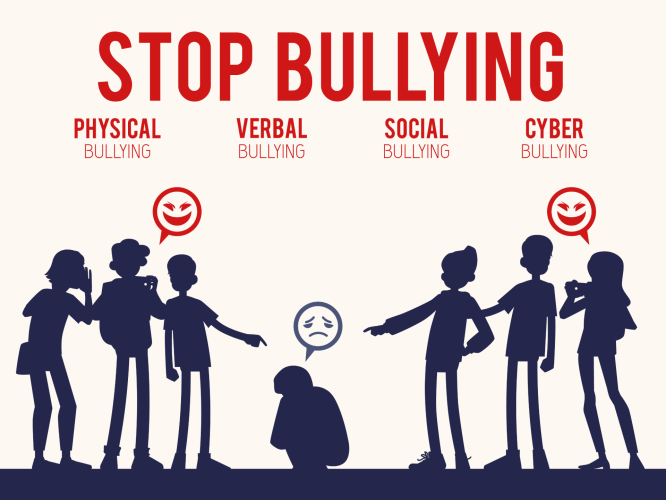Anagh Coar Primary School Anti-Bullying Policy
UNCRC:
Article 12: Children have the right to give their opinion and for adults to listen to it and take it seriously.
Article 19: Children have the right to be protected from being hurt and mistreated, in body or mind.
Article 29: Education should help you to learn to respect other people.
INTRODUCTION
At Anagh Coar Primary School we are committed to providing a caring, friendly and safe environment for all of our pupils so they can learn in a relaxed and secure atmosphere. Bullying of any kind is unacceptable at our school. If bullying does occur, all pupils should be able to tell and know that incidents will be dealt with promptly and effectively.
Defining Bullying
The Department for Children, Schools and Families (DCSF) defines bullying as:
“Behaviour by an individual or group, usually repeated over time, that intentionally hurts another individual or group, either physically or emotionally.”
Types of bullying Examples
Emotional being unfriendly, excluding friends, tormenting (e.g. hiding books, threatening gestures)
Physical pushing, kicking, hitting, punching or any use of violence
Racist racial taunts, graffiti, gestures
Sexual unwanted physical contact or sexually abusive comments
Homophobic because of, or focussing on the issue of sexuality
Verbal name-calling, sarcasm, spreading rumours, teasing
Cyber All areas of internet, such as email and internet chat room misuse. Mobile threats by text messaging and calls
Misuse of associated technology, i.e. camera and video facilities
Awareness Raising
Development of an anti-bullying policy through consultation with the whole school community at staff meetings, parent meetings, school council meetings, whole school assemblies (anti-bullying week), governor’s meetings, lunchtime ancillaries and kitchen staff meetings
School wiki/website - a page for information about bullying for parents and to celebrate children’s behavioural achievements
Child friendly bullying posters in classrooms
Involvement of the local community police liaison officers
Policy Aims
All teaching and non-teaching staff, governors, pupils and parents should have an understanding of what bullying is.
All teaching and non-teaching staff and governors should know what the school policy is on bullying, and follow it when bullying is reported.
As a school we take bullying seriously. Pupils and parents should be assured that they will be supported when bullying is reported.
Bullying will not be tolerated.
Everyone is responsible for preventing bullying.
Responding to Bullying
Everybody has the right to be treated with respect.
Bullying hurts. No one deserves to be a victim of bullying.
Pupils who are bullying need to learn different ways of behaving.
The school has a responsibility to respond promptly and effectively to issues of bullying.
Implementation of the Policy
Procedures
Report bullying incidents to staff, which will be recorded.
In serious cases, when bullying is persistant, parents shall be informed and will be asked to come into school to discuss the problem.
If necessary and appropriate, police may be consulted.
The bullying behaviour or threats of bullying must be investigated and the bullying stopped quickly.
An attempt will be made to help the bully (bullies) change their behaviour.
Outcomes
The bully (bullies) will be asked to genuinely apologise. Other consequences may take place e.g. loss of playtimes, going home at lunchtimes for a period of time.
In serious cases, suspension or even exclusion will be considered.
If possible, the pupils will be reconciled.
After the incidents have been investigated and dealt with, each case will be monitored to ensure repeated bullying does not take place.
Prevention
We will use the methods below for helping children to prevent bullying, as and when appropriate:
writing stories or poems or drawing pictures about bullying.
reading stories about bullying or having them read to a class or assembly.
making up role-plays.
discussions about bullying and why it matters.
PATHS Lessons - Promoting Alternative Thinking Strategies - covers appropriate behaviour choices
P4C (Philosophy for Children) programme - discussing abstract ideas around bullying
class rules/charters, determined by the children, based on positive behaviours (PATHS)
recognition and reward for appropriate behaviours e.g. merits, stickers, certificates, Green Slips at lunchtimes and Captain’s Table.
Monitoring, Evaluation and Review
The Senior Leadership Team will be responsible for monitoring, evaluation and review of the anti-bullying policy. The log book of incidents will be analysed for the number of incidents, location of bullying and type of bullying etc.
The effectiveness of the policy will be carried out by the Senior Leadership Team in consultation with the whole school community through using parent questionnaires, PSHE (Personal, Social and Health Education) lessons and assemblies, school council discussions, Governor’s meetings, suggestion boxes and the school wiki/website.
The success of the policy will be determined by:
a higher awareness by pupils and staff of bullying issues.
a clear understanding by all parties of the procedures to follow.
pupils less accepting of bullying.
a reduction in bullying incidents.
pupils more prepared to report bullying.
Updated: September 2021 Next Review: September 2022
Here are some useful links for parents to support your child in this area:
https://anti-bullyingalliance.org.uk/

